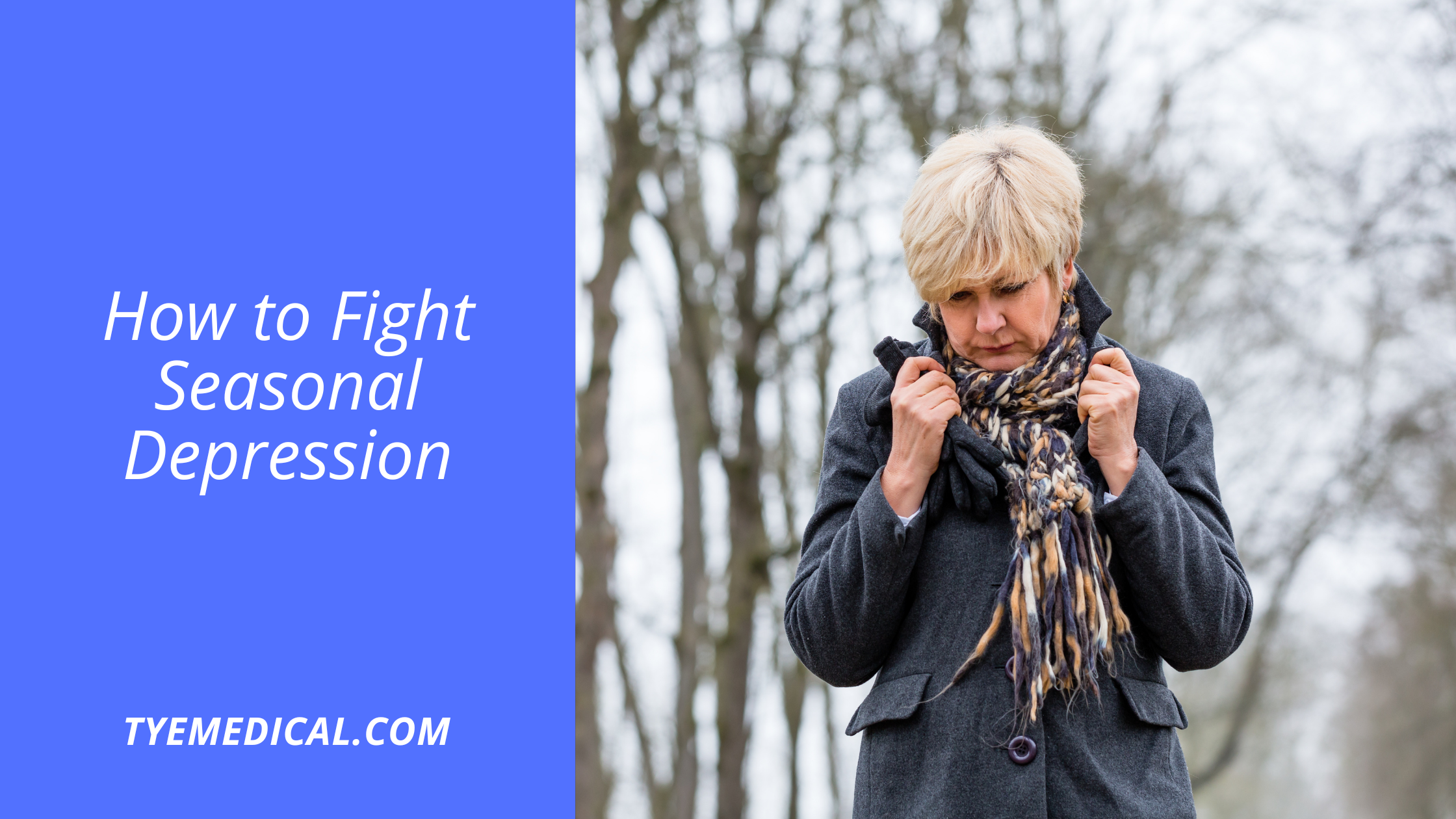How to Fight Seasonal Depression
Written by TYE Medical on Jan 30th 2025
It’s easy to find reasons to feel down this time of year. The holidays are in the rearview mirror as you’re flung back into your daily routine while the colder, darker days of winter seem to drag along. Why does this affect us so much? It’s not all in your head. Biological evidence suggests that the lack of exposure to light disrupts your body’s circadian rhythms and internal clock. This contributes to seasonal depression, also known as seasonal affective disorder (SAD).
But you can mitigate these symptoms and fight seasonal depression. You’ve probably heard that eating a healthy diet and getting regular exercise boost mood and combats SAD symptoms. But diet and exercise alone don’t work for everyone. Here are some additional ways to boost your mood and combat seasonal depression.
1. Take Psychological Breaks

It’s understandable to feel irritated and overwhelmed with your life at times. But if you feel yourself being pulled into a depressive mood, then it’s time for a time out, however brief. As soon as possible, pull away from whatever task occupies you at present and engage in something that makes you happy. It can be as simple as spending a few minutes on a hobby like crafting, reading, cooking, or even taking a walk. Whatever makes you smile, spend some time doing it before returning to your usual routine.
If you have time, certainly use give yourself a psychological break from the norm. But if you’re at work, take a short hiatus to play a song, take a walk, or read a few pages. This can give your mind the boost it needs to fight seasonal depression.
2. Spend Time in Nature

It’s no secret that many people feel release, peace, and comfort when experiencing the outdoors. There is something incredibly stress relieving and pleasurable about being in nature, soaking it in, and enjoying its beauty.
If you’re short on time and live in the city, look for a park nearby or consider a pet. Just spending time with an animal can boost your mood and relieve those down feelings. Even if you’re at work, take a brief break and walk outside for a few minutes. If you’re amid concrete and buildings, just the outdoor air and sky above can give you enough natural experience to relax your mind and lift your mood.
3. Break from Your Routine

To fight seasonal depression, you may need to break from your routine for longer than a walk through your neighborhood. Conventional routines become monotonous and can deplete your mood. But breaking that routine and going in another, more pleasurable direction for a while can beat back depression.
Sometimes it’s best to take a day trip or plan a longer vacation. This takes your mind to a whole other place (literally), broadening your scope. Your thoughts will no longer be focused on the usual cares, concerns, and responsibilities. And even though you must return to routine at some point, the break can mentally recharge you.
Can’t leave for a while? Then consider shaking up your routine where you’re at. Rearrange the furniture in your house, declutter spaces, or change-up your decor. These seemingly small changes are enough to shift your mind out of its usual place and excite your creative side.
4. Try Volunteering

Self-focus has a way of increasing seasonal depression. But when you’re helping someone else a mental shift occurs as you invest your thoughts and efforts in another person. When considering a way to volunteer, start with something you’re most interested in.
You might try volunteer options like:
- Serving meals at homeless shelters (or soup kitchens)
- Helping at a community event
- Working with Meals on Wheels or a food pantry
- Mentoring or tutoring
- Getting involved at a local church or place of worship
Not only does volunteering help you take your mind off of yourself and your responsibilities, it also prevents isolation. When you’re involved in the community, It’s impossible to stay wrapped up in your own internal world oblivious to others. Volunteering can also give you more purpose in life.
5. Check Your Wardrobe

You can fight seasonal depression with what’s hanging in your closet. While it might sound simple and a bit vain, wearing your favorite outfit on your “bad days” can give you a mental boost. This doesn’t mean wearing your favorite usual outfit. Instead, it means pulling out those extra special clothes that you’re saving for a future (as yet unknown) event. Instead of waiting, wear it on a “normal” day to jumpstart your confidence now.
Adding a few new outfits to your wardrobe can also help you fight the blues. Try spreading it out, buying a new outfit now and another later. This is especially helpful if you don’t have any “special” clothes or a wardrobe that hasn’t been updated in a long time.
6. Acupuncture May Affect Mood

“Tapping” may help you fight seasonal depression. It’s part of an acupuncture method known as the emotional freedom technique (EFT) and involves “tapping” on acupuncture points. This technique can help reduce stress, manage emotions, and calm anxiety. In addition to acupuncture, this approach draws on theories like neuro linguistic programming and cognitive behavioral therapy.
7. Schedule Caffeinated Power Naps
Strategically planned naps with a caffeine kick can improve mood and push back against seasonal depression. You may be sleep deprived for many reasons, and coming off the holidays, it’s even more likely that you’re lacking in zzz’s. Try drinking caffeine in the mid-afternoon and then nap for 20 minutes. During that time, the caffeine absorbs into your system, so when you awake, you’re not groggy and truly energized.
The caveat is that this won’t work if you’re caffeine sensitive. You don’t want an afternoon caffeinated power nap to disturb your nightly rest. If that’s the case, you can skip the caffeine and just take a 20-minute power nap.
8. Enjoy a Mindful Walk

This is a different kind of walk. Instead of walking for exercise, or just to escape your current routine, the purpose of this walk is to focus on your outdoor surroundings. Not only are you away, but you’re also present somewhere else.
While walking, be mindful of what you are seeing, hearing, smelling, even touching. Pay attention to detail. You may not be walking in the most scenic of areas, but you can still notice and appreciate little things, like the violet growing up through the cracks in the sidewalk or the warm breeze hitting your face as you walk.
As you notice and appreciate your surroundings, it alters your emotions and mood, breaking the fog of seasonal depression. Even if you don’t have time for a regular mindful walk, at least one study suggests that 15 minutes of mindful walking every week can notably improve your emotional state.
9. Renew Anticipation

Disappointment after the holidays pass can leave you feeling “blah” with nothing to look forward to anymore. The only thing in front of you is the same old routine. Another way to fight seasonal depression is to add anticipation to your life. What could you do to create anticipation again?
Put something on your schedule that you can look forward to, like a spring vacation, or starting a new hobby, taking lessons, or getting together with a long-distance friend. Find something that works for you and your finances and mark the date. Begin a countdown if you must, but this can really get your focus off of disappointment and drudgery. Anticipation is a positive feeling that increases your overall mood.
10. Plan for the Short Term

After scheduling an anticipation revving event, consider what you can plan for and enjoy in the short term. Even in December, you can begin scheduling activities and meetups with friends for January and February.
This helps you head those doldrums off before they settle in. While you might feel nostalgia for holidays behind you, you can begin to look forward to what is planned next. Start making plans with family and friends and consider what activities would make you happy. Then schedule them. This is especially helpful for retired seniors who have additional time in their schedule.
Don’t Give in to Seasonal Depression
If you’re feeling down during winter, don’t think continued sadness is inevitable. Ultimately, spring will come and change will happen. But meanwhile, be sure to take care of yourself by making healthy food choices, exercising, and getting enough rest.
Make a conscious effort to take brief psychological breaks throughout the day, doing something you enjoy. And as time allows, spend more time doing what you love. It also helps to plan for a longer break like a spring or summer vacation.
It’s also important to spend time in nature and volunteer. These activities remind you that the world is bigger than your circumstances and daily routine. And to further prevent isolation, schedule time with your family and friends. You and anyone you spend time with need a listening ear, encouragement, and to think of someone else. These are tools you can use to fight seasonal depression.


